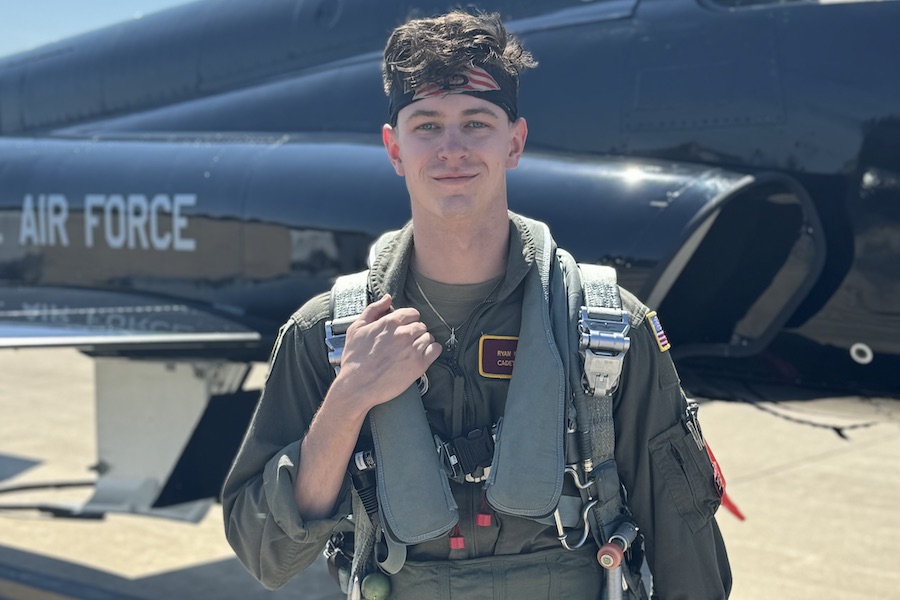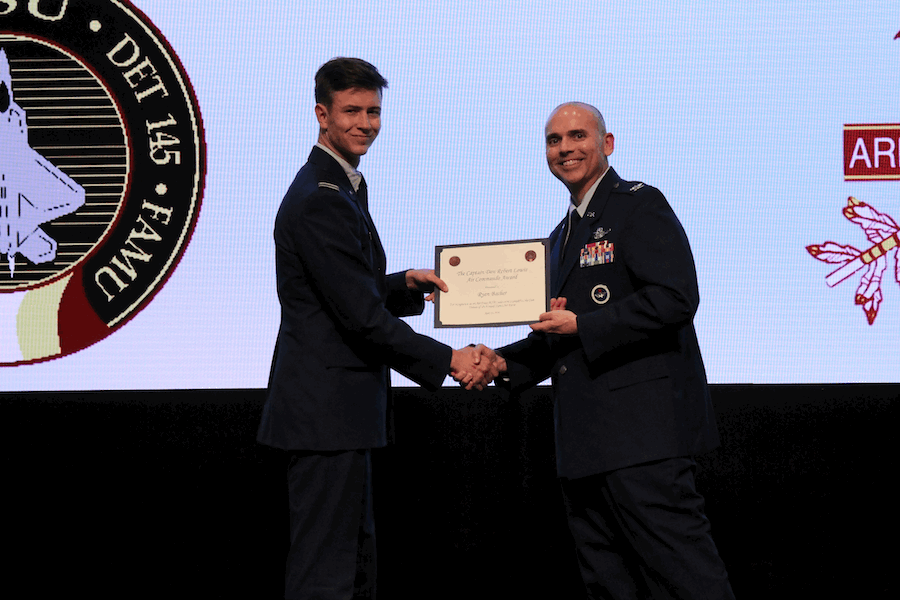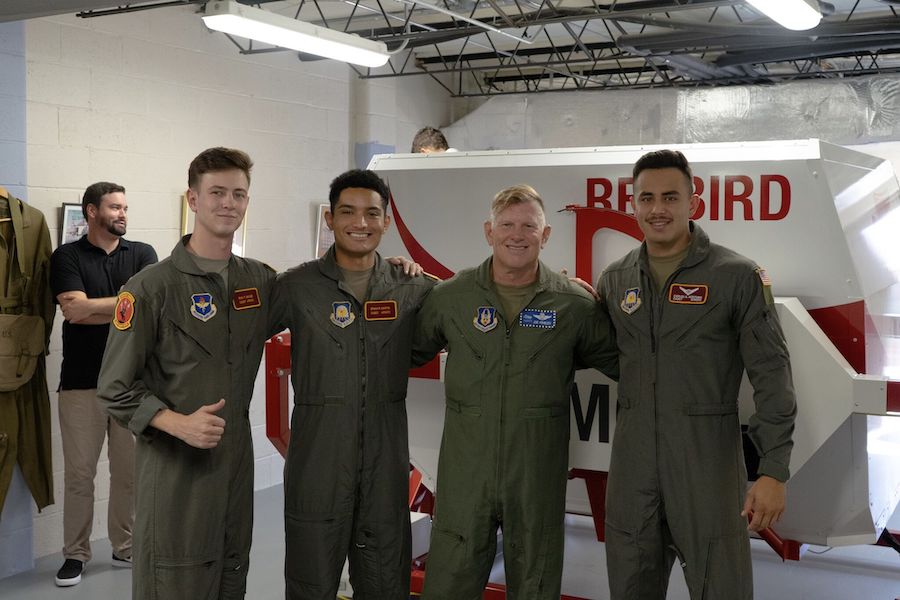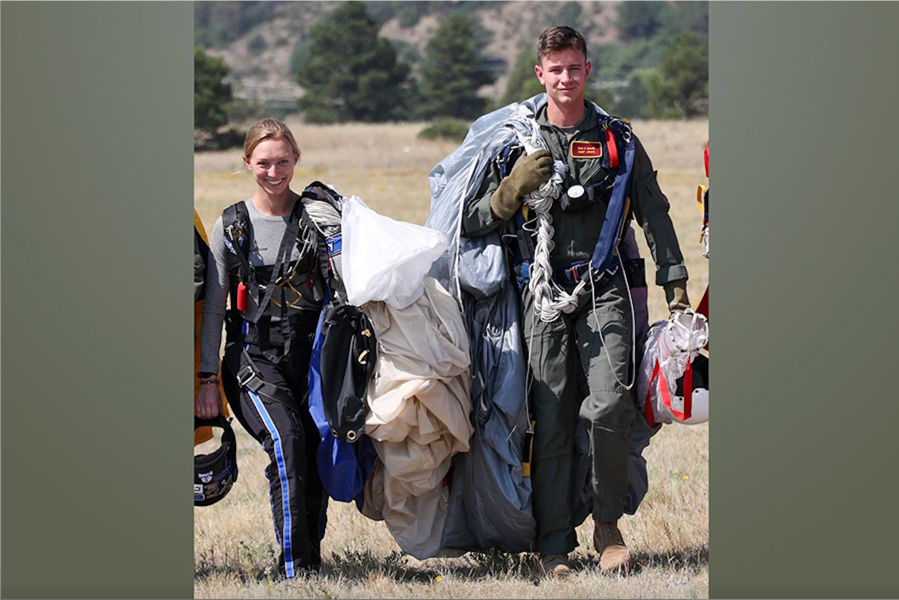Student Spotlight: Ryan Bachér

Ryan Bachér is a senior at Florida State University pursuing a cyber criminology degree through the Department of Computer Science, part of the College of Arts and Sciences and the College of Criminology and Criminal Justice. Bachér is an operations group commander in FSU’s Air Force ROTC and will graduate and commission as a second lieutenant in May 2025. In October 2024, Bachér was one of three FSU students selected for Euro-NATO Joint Jet Pilot Training — the world's only multi-nationally manned and managed flying training program chartered to produce combat pilots for NATO — at Sheppard Air Force Base in Wichita Falls, Texas, which he will begin after graduation. Program selection is based on one’s order of merit number, encompassing factors like GPA and commander’s rank, or an officer’s subjective assessment of a cadet. Bachér holds the highest order of merit number of all FSU ENJJPT selects over the past four years.
Tell us a little about your background, where you’re from, and what brought you to FSU.
My father was a helicopter pilot in the Army and Coast Guard. I’ve always wanted to be a fighter pilot, and when the then-education officer for Air Force ROTC gave me a tour of the ROTC program, I was sold. I thought, “This program is insane in the best way.”
What inspired you to pursue a degree in cyber criminology?
I received the Air Force ROTC College Scholarship Type 7 to attend FSU as a technical, or STEM, major based on the Air Force’s whole person concept, which lays a foundation of service for Airmen through leadership, job performance, self-improvement and community involvement. The selection process also included reviewing my academics and conducting various interviews.
I started as an astrophysics major because I enjoyed physics. Some students in ROTC balance that workload, but I wanted to focus more on ROTC. I tried civil engineering, which also didn’t fit, but it brought me closer to my interests in coding, science and math. Cyber criminology was a good balance.
What aspect of your studies do you find most rewarding?
Quantifying and mitigating correlating crime factors to look at the relationship among components – like income and peer influence – on crime. The goal is how we can help reduce and manage crime and those affected.
I also enjoy aerospace studies. Capt. James McMaster, FSU Air Force ROTC’s education officer, teaches National Security Studies and Preparation for Active Duty, and I’ve enjoyed learning about the nuances of being an officer.
Why did you join Air Force ROTC?
My love for aviation grew because of my dad’s service. I believe defending the free world is an honor, and being a fighter pilot is a way I can do so. Patriotism and pride, especially after events such as 9/11, resonates with me heavily.
Tell us about your role as operations group commander.
Since Fall 2024, I’ve led almost 100 underclassmen through weekly trainings which include two physical trainings and a two-hour lab. My biggest takeaway has been learning to delegate while I execute my own tasks like writing award packages and orders. Learning to take a step back, managing my time, and tailoring people’s strengths for assignments has been a huge learning curve but something I’ve enjoyed.
Tell us about being the co-founder and Student Government Association liaison of FSU’s Student Aviation Club.
Jacob Pamplin, my Air Force ROTC mentee, suggested we create a centralized hub to further promote the program. After discussing some ideas, I went in front of our ROTC unit — without telling him — and announced that he was SAC president. I served as vice president in 2023; we were a phenomenal team. SAC has a network of Air Force officers and civilian aviators from FedEx, American Airlines and more. We’ve connected people through a network of alumni from FSU and beyond.
Tell us about being selected for ENJJPT.
Getting a pilot’s slot while still in Air Force ROTC is a crazy accomplishment, and pilot training is selective. When I was a freshman, I got the impression from the older cadets that ENJJPT selection was nearly impossible, but my buddies inspired me to work for it. Sure enough, I was accepted with two of my best friends.
Once I graduate, I’ll start with a job on base for a few months then complete initial flight training for a month to understand the basics of military aviation. Then, we begin the 55-week ENJJPT program. It wraps up with drop night where we share funny stories, get assigned call signs, and find out what airframe, or type of aircraft, we’ll fly and where.
What on-campus resources have helped you achieve success?
The FSU Student Technology Fee was paramount. Casey Perkins, an aerospace ROTC office administrator, told me about the fund’s potential. I thought about how a full-motion flight simulator could assist students with their order of merit number, which is vital to anyone’s pilot slot chances. You can boost your score by completing flight hours through the simulator. With help from the College of Arts and Sciences and the Department of Aerospace Studies, our $105,000 simulator proposal was approved, allowing everyone to enhance their skills.
Are there any faculty or staff who have helped or inspired you?
Master Sgt. Philip Gordon, the Air Force ROTC enlisted instructor, has passed along leadership advice from his perspective. Perkins guided me through the flight simulator project and tied it all together. I also want to be a commander like Col. Ogle, the commander of Air Force ROTC at FSU. We’ll produce better officers because of the mentorship and culture he’s brought in.
Following your graduation, what are your plans? Even though you might miss FSU, what are you looking forward to once you graduate?
My recent endeavor has been achieving top health; the anti g-straining maneuver you perform when flying requires peak fitness, so I’ll be working out to prepare myself for active duty.



